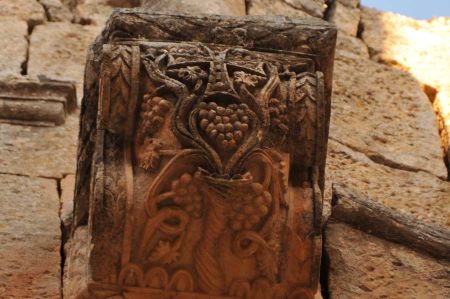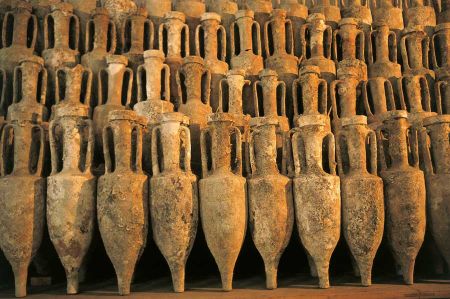Viticulture in ancient Greece – our experience
- Written by Portal Editor
From archaeological findings of grape seeds in Dikili Tash, a tell near Philippi in the Drama regional district, researchers discovered that grapes were processed from wild grapevines in Greece as early as the late Neolithic period.
After another find in what is now Iran, the findings in Greece are the second oldest evidence of this type in the world.
Several centuries later, during the early Bronze Age, there are already numerous evidences of the widespread use of the grapevine. Excavations on the island of Crete reveal the pre-Greek history of viticulture in this region. One of the oldest wine presses in the world can be seen in Vathypetro, an archaeological site near Archanes. The excavated stone press and numerous clay vessels from the Minoan culture show that Crete was the cradle of commercial Greek viticulture. The resinated wines that are still produced today are likely to have their origin in the previously practiced preservation method, in which the walls of the amphorae were sealed with resin.
Way of wine cultures via the Cyclades

Archaeological evidence of intensive viticulture during the Mycenaean culture between 1600 and 1150 BC are abundant. In addition to dried seeds and the remains of pressed berries, there are numerous images on ceramic works such as pots and vases.
The berries were mashed in a vessel called Linos in his time. The juice obtained was usually put into a pithos for alcoholic fermentation using a goat skin wine tube. Amphorae were used in antiquity as storage and transport vessels for oils and wine, garum, tropical fruits such as dates and others.
Wine to be mixed with water

To fill the transport vessels, ladles or vessel shapes such as the kyathos were used. Jugs such as Oinochoen or Olpen were used for transport and pouring. The skyphos, the kantharos and the occasionally very popular kylix drinking bowl served as drinking vessels. In some regions, special shapes emerged as drinking vessels, in Laconia, for example, the Lakaina was particularly popular. With their drinking and feasting culture, the Greeks had a great influence on other Mediterranean areas; especially the Etruscans were very much oriented towards the Greek drinking culture.
Reports about Viticulture came up with Homer already
Hesiod was the first Greek author to deal with work in the vineyard and the making of wine in his work. In his epic didactic poem Works and Days, the author, who lives in the 7th century BC, reports on the grape harvest on the island of Chios. In addition, Hesiod reports on the correct storage of the wine.
Theophrastus deals with questions of wood technology
In the archaic period (700 - 500 BC) there was a great colonization of the Mediterranean area. In addition to overpopulation and securing trade routes, the reasons were internal struggles in Greece. Wine exports benefited considerably from this colonization. In addition to Athens as the most important domestic market, markets were opened up on the Black Sea, along the Danube as far as what is now Austria, in southern Italy to Solunto and to Etruria. The most important means of transport was the ship. With the founding of Massalia, today's Marseille, the Greeks gave the local Celts their first insights into commercial viticulture and thus laid the foundation for viticulture in France before the Romans.
Wine as trade good from Island of Ikaria
The importance of wine grow since the 5th century BC at the latest. The example of Thasos, the northernmost Aegean island, shows that a wine law was already known here 2,400 years ago. On two marble slabs that were found on Thasos, there were inscriptions relating to regulations for wine production and the wine trade. In addition to taxation, the trade in grapes, must and wine was also regulated. To control the export, the amphorae were marked with stamps.
In addition to wine taxation, the rulers issued legal regulations for wine production. Also in ancient Greece one seriously dealt with the cultivation of grapes. The enormous level of knowledge of the ancient Greeks also provided development aid to other peoples with regard to viticulture.
Wine highly welcomed with Greeks and Romans
Today's Monemvasia is the namesake of one of the most important export goods of the eastern Peloponnese, the Malvasia wine. The prohibition of belief in gods in Greece after the introduction of Christianity had at least a short-term impact on wine, as almost all activities in viticulture were related to the now forbidden god Dionysus. The transfer of power from Rome to Constantinople after the division of the empire in 395 did not bring about the hoped-for easing of exports. Viticulture was almost exclusively restricted to personal consumption or consumption in the monasteries.
Apart from resin, flavoring wines has almost been given up. The dilution of wine was also frowned upon. Nonetheless, the name krasi was retained, derived from the Greek verb for "to mix", which therefore previously o just applied to diluted wine; to this day it is synonymous with wine. The expansion of sweet dessert wines based on partially raisined berries became more and more popular.
Loosing monopoly of viticulture to Venice
The privileges enabled the Republic of Venice to import foreign wines at unrivaled low prices. This brought many of the local producers to the brink of ruin. The largest export markets of mainland Greece and Crete had also passed into the hands of the Italians.
Please also read:
A wine tasting at Rapsani in Thessaly
The wine network and Turkish wines and oils
Dernau - the wine paradise lures us to the Ahr
